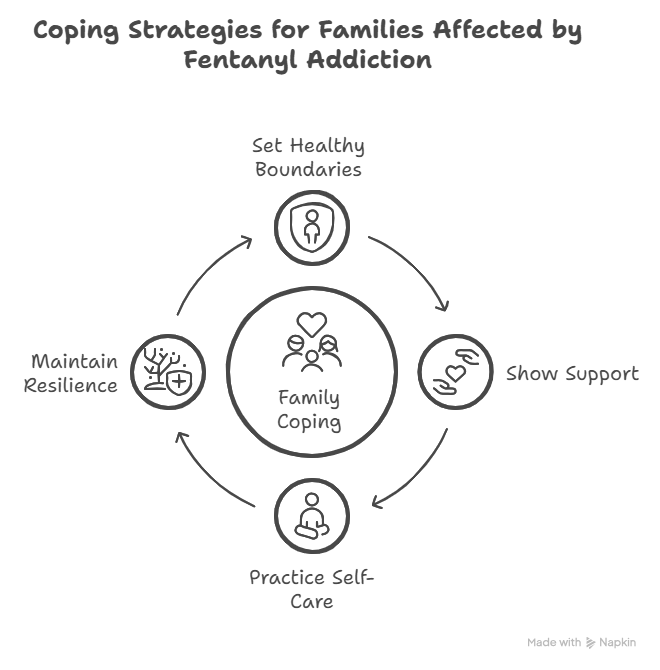Watching a loved one struggle with fentanyl addiction can be a devastating experience for families. The emotional toll of this crisis can be overwhelming, causing feelings of helplessness, anxiety, and fear.
The impact of fentanyl family trauma can be far-reaching, affecting not only the individual struggling with addiction but also their loved ones. Families may experience a range of emotions, from sadness and anger to guilt and frustration.
Understanding the emotional challenges that families face when dealing with fentanyl addiction is crucial in providing support and guidance. By acknowledging the complexities of this issue, we can work towards healing and recovery.
Key Takeaways
- Fentanyl addiction affects not only the individual but also their loved ones.
- Families may experience a range of emotions, including sadness, anger, and guilt.
- Understanding the emotional challenges is crucial in providing support.
- Families need guidance and support to navigate this crisis.
- Healing and recovery are possible with the right approach.
Understanding Fentanyl Addiction and Its Severity
Understanding the severity of fentanyl addiction is crucial for families to grasp the risks associated with this potent opioid. Fentanyl is a synthetic opioid that is significantly more potent than heroin and morphine, making it highly addictive and dangerous.
Fentanyl addiction affects families in multiple ways, causing emotional distress and complicating the management of family stress from fentanyl use. The emotional turmoil can be overwhelming, making it essential for families to understand the risks and consequences of fentanyl addiction.
What Makes Fentanyl Particularly Dangerous
Fentanyl’s high potency and rapid onset of effects make it particularly dangerous. It can lead to respiratory depression, causing overdose and death, even in small doses.
The Rapid Progression of Fentanyl Dependency
The dependency on fentanyl can progress rapidly due to its highly addictive nature. Users can develop tolerance quickly, leading to increased consumption and a higher risk of overdose.
The Reality of Fentanyl Family Trauma
Fentanyl addiction doesn’t just affect the individual; it sends shockwaves through the entire family, causing trauma that can be long-lasting. The emotional toll on family members can be overwhelming, affecting their daily lives and relationships.
The constant uncertainty and fear of losing a loved one to addiction can lead to a state of hypervigilance, making it difficult for family members to cope with their emotions and daily challenges. This environment fosters grief, fear, and anxiety, which become integral parts of their daily life.
Grief, Fear, and Anxiety in Daily Family Life
Family members often experience a deep sense of grief due to the loss of the person they once knew, as addiction can significantly alter a person’s behavior and personality. The fear of overdose and the anxiety of not knowing what each day will bring are ever-present, creating a stressful and tense home environment.
Guilt and Self-Blame Among Family Members
In addition to the emotional challenges, family members often grapple with guilt and self-blame. They may question whether they could have done something differently to prevent their loved one’s addiction or whether they are to blame for not being able to “fix” the situation.
Emotional Exhaustion and Compassion Fatigue
Caring for a loved one struggling with fentanyl addiction can lead to emotional exhaustion and compassion fatigue. The continuous strain of supporting someone through their addiction, coupled with the fear of potential overdose, can leave family members feeling drained and helpless.
Understanding these dynamics is crucial for developing effective support systems for families affected by fentanyl addiction. By acknowledging the trauma and emotional challenges they face, we can begin to provide the necessary resources and strategies for coping with family trauma.
The Devastating Impact of Overdose Scares and Loss
The devastating impact of fentanyl overdose scares and loss on families cannot be overstated. Families dealing with fentanyl addiction live in constant fear of losing their loved ones to an overdose. This fear is not unfounded, as fentanyl is a highly potent opioid that can cause overdose and death even in small quantities.
Trauma from Witnessing or Responding to Overdoses
Witnessing or responding to an overdose can be traumatic for family members. The experience can leave lasting emotional scars, including anxiety, fear, and a heightened sense of vulnerability. Families may also experience post-traumatic stress disorder (PTSD) symptoms, such as flashbacks and nightmares, after witnessing an overdose.
Living with Constant Fear of Fatal Overdose
Living with the constant fear of a fatal overdose is a significant source of stress for families affected by fentanyl addiction. This fear can lead to hypervigilance, where family members are always on the lookout for signs of overdose, and can result in emotional exhaustion. Some key challenges include:
- Constantly monitoring the loved one’s behavior and health
- Being prepared to respond to an overdose at any moment
- Dealing with the emotional aftermath of an overdose scare
Families need support and resources to manage these challenges effectively.
How Family Dynamics Change During Addiction
The impact of fentanyl addiction on family dynamics is profound, leading to shifts in roles, communication, and financial stability. As the addiction progresses, family members often struggle to cope with the changes, leading to a complex web of emotional and practical challenges.
Family dynamics are significantly altered as members adjust to the addict’s behavior, often resulting in an unsustainable environment.
Shifting Roles and Codependency Patterns
Fentanyl addiction can cause family members to assume new roles, often leading to codependency patterns. For instance, a parent may become overly protective or enabling, while a sibling may take on a caretaking role. As stated by Narcotics Anonymous, “codependency is a pattern of behavior that can be changed with the right support.”
This shift can lead to an unhealthy dependence on the addicted individual, creating a toxic cycle that’s difficult to break.
Communication Breakdown and Trust Issues
Effective communication is often the first casualty of fentanyl addiction, as family members struggle to address the issue or feel forced to hide the truth.
“The single biggest problem in communication is the illusion that it has taken place.” – George Bernard Shaw
This quote highlights the importance of clear communication, which is often lacking in families dealing with addiction.
Trust issues arise as family members grapple with feelings of betrayal, hurt, and frustration, further straining relationships.
Financial and Social Consequences
Fentanyl addiction can have severe financial consequences, including medical bills, lost income, and legal expenses. Families may also experience social isolation as they struggle to cope with the stigma associated with addiction.
The financial strain can be overwhelming, leading to a decrease in the overall quality of life for the entire family.
Coping Strategies for Families Affected by Fentanyl Addiction
Navigating the complexities of fentanyl addiction within a family context requires a multifaceted coping plan. Families must balance supporting their loved one with protecting their own well-being. Effective coping strategies are crucial for navigating this challenging journey.
Setting Healthy Boundaries While Showing Support
Setting healthy boundaries is essential for families to maintain their emotional and physical well-being. This involves clearly communicating what is and isn’t acceptable behavior, thereby protecting family members from the negative impacts of addiction. By doing so, families can continue to show support without enabling the addict’s behavior.
Self-Care Practices for Family Members
Self-care is vital for family members dealing with the stress of fentanyl addiction. Engaging in activities that promote relaxation and joy, such as exercise, hobbies, or spending time with supportive friends, can help mitigate the emotional toll. Prioritizing self-care enables family members to maintain their resilience and continue supporting their loved one effectively.

When and How to Seek Professional Help
Recognizing when to seek professional help is crucial. Families should consider therapy or counseling to address the emotional trauma associated with fentanyl addiction. Professional guidance can provide families with the tools and resources needed to cope effectively and support their loved one’s recovery journey.
Resources for Healing and Recovery
Healing from the impact of fentanyl addiction requires access to the right resources and support systems for families. The journey to recovery is often challenging, but with the appropriate support, families can navigate this difficult period more effectively.
One crucial aspect of recovery is family therapy. Family therapy options for substance abuse are designed to help families understand and address the complexities of addiction.
Family Therapy Options for Substance Abuse
Family therapy can play a pivotal role in the recovery process by providing a platform for families to communicate effectively and work through their challenges together. Therapies such as Behavioral Couples Therapy and Family Systems Therapy are particularly effective in this context.
| Therapy Type | Description | Benefits |
|---|---|---|
| Behavioral Couples Therapy | Focuses on improving communication and relationship dynamics between partners. | Enhances mutual support, reduces conflict, and improves relationship satisfaction. |
| Family Systems Therapy | Examines the family as an emotional unit, understanding how individual behaviors affect the family dynamics. | Helps in identifying and changing negative patterns, improving overall family functioning. |
Support Groups and Community Resources
In addition to family therapy, support groups and community resources are vital for families dealing with fentanyl addiction. Organizations such as Nar-Anon and Smart Recovery offer support and guidance for family members.
“The support of others who are going through similar experiences can be incredibly comforting and helpful in navigating the challenges of addiction.”
These resources provide a safe space for sharing experiences, receiving support, and learning coping strategies. They are an essential part of the recovery process, offering ongoing support and connection.
Conclusion
Fentanyl addiction can have a devastating effect on families, causing emotional trauma that can be long-lasting. The emotional toll of fentanyl family trauma can be overwhelming, affecting daily life and relationships. Coping with family trauma requires a comprehensive approach that includes seeking professional help and support.
Families affected by fentanyl addiction must prioritize their well-being and seek resources to heal and recover. By understanding the severity of fentanyl addiction and its impact on family dynamics, families can take the first step towards recovery. Effective coping strategies, such as setting healthy boundaries and practicing self-care, can help families navigate the challenges of fentanyl addiction.
By acknowledging the reality of fentanyl family trauma and seeking support, families can begin to heal and rebuild their lives. Resources such as family therapy and support groups can provide a safe and supportive environment for families to cope with the trauma associated with fentanyl addiction.
FAQ
What are the emotional challenges families face when dealing with a loved one’s fentanyl addiction?
Families often experience a range of emotions, including grief, fear, anxiety, guilt, and self-blame, which can lead to emotional exhaustion and compassion fatigue.
How does fentanyl addiction impact family dynamics?
Fentanyl addiction can cause shifts in roles, lead to codependency patterns, create communication breakdowns and trust issues, and result in financial and social consequences.
What coping strategies can families use to deal with the emotional impact of fentanyl addiction?
Families can benefit from setting healthy boundaries, practicing self-care, and seeking professional help, such as family therapy and support groups.
How can families support a loved one struggling with fentanyl addiction while also protecting their own well-being?
By setting healthy boundaries, practicing self-care, and seeking support from professionals and support groups, families can support their loved one while maintaining their own emotional and physical health.
What resources are available to help families heal and recover from the impact of fentanyl addiction?
Families can access family therapy options, support groups, and community resources to help them navigate the challenges of fentanyl addiction and support their loved one’s recovery.
How can families manage the trauma associated with witnessing or responding to overdoses?
Families can seek professional help, such as therapy, and join support groups to process their trauma and develop coping strategies to manage their fear and anxiety.
What are the signs that a family needs to seek professional help for fentanyl addiction?
Families should seek help if they are experiencing significant emotional distress, struggling to cope with their loved one’s addiction, or if the addiction is impacting their daily life and relationships.
Reference




